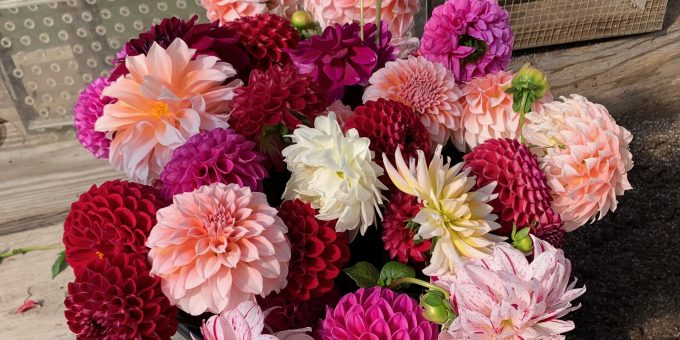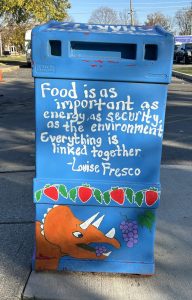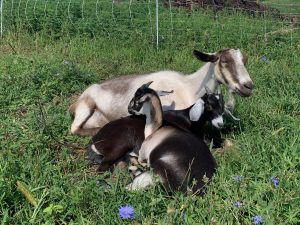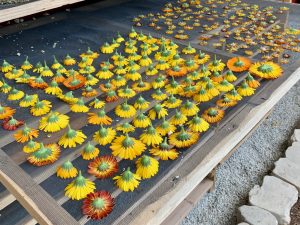
Courtesy Taylor Hartson
Playing in the Dirt
I’m crouched down in a vegetable bed on one of the first true fall days of the 2023 growing season. The leaves have just started to turn, with only a few golden patches peeking out of the timber surrounding the farm I’m visiting. My fingernails are caked in dirt as I work across from Cedar, one of the folks who helps run this queer regenerative agriculture collective in the heart of the Midwest. Our hands alternate in careful rhythm as our fingers grasp the bases of dandelions and wood sorrel, unearthing beets hidden among the leafy and abundant weeds. My audio recorder rests in the soil between us as we talk, and I have to pick it up and set it back down as we inch our way down the row.
Cedar reflects on how their queerness shapes their approach to growing food, sifting through a new patch of weeds as they mull over my question. “I think a really beautiful part of queerness is a creativity, a curiosity of getting to know other people around us, and I feel like that translates to other life around me, and—.” Cedar cuts their sentence off to point out a wooly bear caterpillar inching up my leg. I hold my hand out flat against my thigh, inviting the caterpillar to crawl up. “Hey, buddy,” I coo, as she wiggles around, putting our interview on hold for a moment. “Cute,” Cedar murmurs, and we return to weeding and chatting. Cedar continues their thought, saying, “I feel like even in getting to know tomato plants and seeing the ways that they are just so flexible and have so much more within them than humans would design them, there’s so much more to every living thing than the most conventional and loudest voices will care to acknowledge and share.”

Cedar is one of more than 60 queer farmers in the Midwest that I’ve spoken to as part of my ongoing dissertation research, which explores queer farmers’ embodied, emotional, and relational practices in their work. As Cedar’s comment indicates, many of these farmers practice holistic and connected ways of growing food. Their approach refocuses attention on the health of interconnected human and non-human communities and allows room for more imaginative, relationally grounded ways of growing food.
Queer farmers’ practices often stand in stark contrast to the dominant ways that food has been grown in the United States for several decades. Conventional growing practices in American agriculture, for example, have tended to prioritize efficiency, profit, and extraction, depleting soil health and taking a toll on farmers’ physical and mental well-being. But even beyond its impact on the ways that people grow food, conventional American agriculture has embraced particular relational structures that historically privilege and support farmers who are White, heterosexual, cisgender men. For example, land access—perhaps the single most important resource for farming—is a site of multiple gendered and sexualized (as well as raced and classed) inequalities. Historically, women’s access to land has been severely limited in contrast to men; even after women were legally allowed to own land beginning in the 20th century, many legal policies led to financial repercussions for land-owning women, and social norms of passing land down through male lineage remained in place. Given these constraints (among many others), intimate (hetero)sexual partnerships remain one of the most common ways to access land and labor. But this strategy leaves queer farmers behind, as this “family farm” model typically doesn’t reflect queer chosen family and partnership.
Despite increased attention from scholars and popular media outlets regarding the ways that heterosexism and cissexism shape agricultural production, there are barriers to change. One of the primary barriers is the lack of formal data on queer farmers and alternative growing practices. For example, the United States Department of Agriculture (USDA)’s Census of Agriculture—the nation’s most comprehensive agricultural dataset—only provides male and female gender options and doesn’t ask about sexuality at all. Their quantitative invisibility often makes it difficult to formally allocate resources and support to queer farmers, and it overlooks the imaginative ways that queer farmers are trying to address larger, interconnected issues like climate change, food insecurity, and community solidarity.A piece published this past summer in the Journal of Agriculture, Food Systems, and Community Development provides some of the first quantitative data on queer farmers, drawing attention to queerness as a dimension of social power within agricultural systems. However, quantitative data is not enough to change the narrative. Both academics and queer farmers themselves have recently taken steps to highlight the experiences, challenges, and needs of these farmers. Recent qualitative studies demonstrate how queer farmers are actively building cooperative communities, creating new types of networks to access resources, navigating and resisting homophobia and transphobia, and creatively accessing land, labor, credit, and knowledge in alignment with their values.

While documenting and incorporating queer farmers’ experiences into dominant agricultural narratives helps bolster outreach efforts and tailor resources within the field of agriculture, these stories also provide broader sociological insight. In my interviews with queer farmers, I’ve found that their stories can help us better understand identity formation processes, collective movement and network building, and queer orientations to (human and non-human) relationships.
Many of the farmers that I’ve spoken with connect their realization and exploration of queer identity with their farming work. Aiden, a gender-queer farmer in their 40s, told me, “When I first started farming, because it was so tied in with my identity and who I was becoming, embracing that queer farmer image was very important to me.” When I asked them to tell me a bit more about the “queer farmer image,” they described a photo from the Queer Farmer Convergence calendar in front of them: “It’s just like people in all their weirdness doing farming things and tattooed. It’s like, ‘I’m gritty, I’m hot, and I can do all the things and I can do them really well.’ That’s what it projects to me, is very capable and harnessing your own agency for once. Finally coming into how you’re meant to be.” Farming—and all the physically demanding work it entails—allows queer people the space to explore new ways of moving their bodies, of practicing new capabilities, and of fashioning their bodies in alignment with their identity—free from the heightened visibility they often experience in more urban places.
Further, this embodiment of queer identity can lead to a desire to challenge relational norms that structure our day-to-day worlds. As Kiwi, a 25-year-old xeno-gender queer farmer, told me:
Being queer requires a lot of care work in the ways that you move through the world, because you already know what it is like to be marginalized. With farming and growing food, you realize that nature and earth is extremely fucking queer. Because of the queerness that I experience and witness in the earth, I have a deeper connection to farming, and the way that I treat the animals and the plants and the people around me is informed by my queerness. In the circles that I am a part of, there’s so much radical care that happens, a lot of love and reciprocity and respect that is always told back to us. When the world doesn’t reflect to you how you want to be treated by other humans and institutions and organizations, the ability to turn to nature and know that all of the parts of myself can be seen and held and also welcomed so lovingly is an extremely beautiful experience.

Kiwi illustrates that queerness as a way of living—and not just as an identity label—shapes the ways they interact with the plants, animals, and humans they grow with and for. This relational connection becomes an important foundation for the kinds of community organizing work that these farmers often engage in as they look to creating more sustainable food systems and social connections.
As my research shows, studying queer approaches to agriculture can help us see how queer perspectives serve as identity-forming and resistance-based projects. Farming becomes a site where many queer people can embody more collective orientations to relationships—including relationships to non-human beings, like animals, plants, and land—and use existing barriers to enact creative strategies that shape generative futures.
Taylor Hartson is a graduate student in the Department of Sociology at the University of Notre Dame. They study gender, sexuality, and sustainable agriculture, and they are an avid cheesemaker and fermentation geek.

Comments